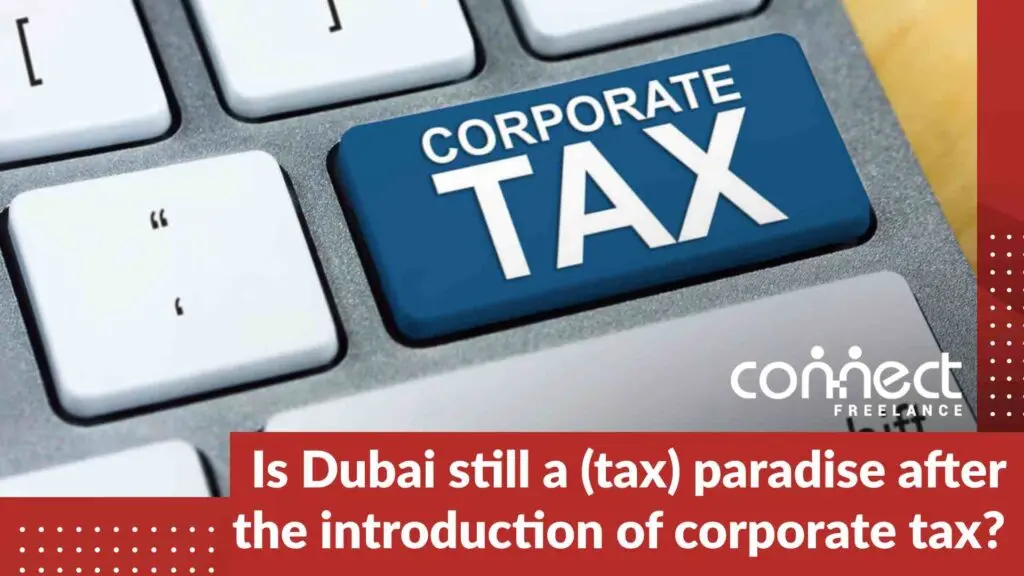Dubai is one of the entities that constitutes the United Arab Emirates (UAE). The emirate has long been known as a tax haven for businesses and individuals. With no federal income tax, no corporate tax, and no capital gains tax, Dubai has attracted many investors and entrepreneurs who want to enjoy its high standard of living and low tax burden. It was usually called tax free Dubai but things are a little different nowadays.
In this article we will discuss if the famous emirate is still a tax paradise after the introduction of different taxes these last few years.
Understanding Dubai’s Tax Haven Reputation

Tax free Dubai reputation dates back to 1905, when it abolished customs duties on trade. Since then, Dubai has developed into a global hub for trade, tourism, finance, and innovation, offering various incentives and benefits to foreign investors and businesses. One of these benefits is the establishment of Free Zones. These are special economic areas that guarantee 100 percent private ownership, repatriation of capital and profit, and exemption from corporate tax for companies registered within them. According to the latest announcement on the tax code change, companies registered with these Free Zones will remain tax exempt but are subject to certain requirements, which remain unspecified.
Dubai as a Tax-Friendly Destination
Despite its tax haven status, Dubai is not immune to the challenges of fiscal sustainability and economic diversification. The UAE, like other Gulf Cooperation Council (GCC) countries, has been facing fiscal deficits and lower oil revenues since the oil price plunge in 2014. This was worsened by the pandemic. Addressing these challenges, the UAE introduced several reforms and initiatives to boost its non-oil revenues to reduce its dependence.
One of these reforms is the introduction of a 5 percent value added tax (VAT) in 2018, which has generated around $26 billion in revenues so far. Another reform is the announcement of a 9 percent corporate tax on businesses in June 2025. The corporate tax is expected to raise around $10 billion annually and apply to all sectors. Except oil and gas, banking, insurance, telecommunications, aviation, hospitality, real estate development, education, healthcare, and charitable activities. Other industries may count into this taxation process.
However, the introduction of corporate tax does not mean that Dubai will lose its competitive edge as a tax-friendly destination. Specially in comparison to other countries in the region and also the world. This means the emirate will probably reman as tax free Dubai.
Furthermore, Dubai’s corporate tax reform is part of its vision to become a more sustainable and diversified economy. Therefore, the emirate can cope with external shocks and global changes. By introducing corporate tax, Dubai aims to increase its fiscal revenues. Therefore, improve its public services, enhance its transparency and accountability, and align its policies with international standards and best practices. Dubai free tax remains committed to providing a favorable business environment that attracts foreign investment and fosters innovation and entrepreneurship.
Corporate Tax Arrival: Changes and Implications
The UAE’s corporation tax 2025 will be 9% on profits (revenue minus costs) of any enterprises earning more than 375,000 AED (about $100,000 USD). Businesses who produce less than this amount will continue to pay no taxes.
In addition to the corporate tax, the UAE has stated that major multinational corporations with income over EUR 750 million will be subject to a 15% tax, in accordance with the Global Minimum Corporate Tax Rate agreement.
Legal entities having noteworthy legal personalities, such as LLCs, PSCs, PJSCs, LLPs, and others, will be taxed. Furthermore, any foreign legal entity earning money in Dubai and the UAE and being a tax resident would be charged. Although free zones are exempt from corporation taxes in exchange for meeting all regulatory criteria, this also applies to free zone enterprises that conduct business with the mainland. Non-residents and residents of the UAE may be subject to corporate taxation regulations as well.
If a business makes income lower than AED 375,000, no tax is levied; if the income is bigger than AED 375,000, the tax will be levied at 9%. Furthermore, larger international corporations with distinct business circumstances will be taxed at a separate rate.
Corporation tax law will contain a participation exemption from corporation tax when receiving dividends or selling shares of a subsidiary firm. Charities, public benefit organizations, investment funds, firms involved in oil and mineral exploitation, and totally government-owned corporations are also exempt from corporate taxes.
Shift in Taxation Landscape
The introduction of the corporate tax is not the only change in Dubai’s taxation landscape. In recent years, Dubai has also implemented other taxes that affect businesses and individuals. For example, in 2018, Dubai introduced a value-added tax (VAT) of 5% on most goods and services sold in the country. The VAT applies to both domestic and imported goods and services, with some exemptions and zero-rated items.
Another example is the excise tax, which was introduced in 2017 on selected products that are deemed harmful to health or environment. The excise tax applies to tobacco products, energy drinks, carbonated drinks, and electronic smoking devices. The excise tax is paid by the producers or importers of these products at the point of entry or production.
These taxes are part of Dubai’s efforts to increase its non-oil revenues, as well as to promote social welfare and environmental protection. However, they also have an impact on the cost of living and consumption patterns in Dubai. For instance, the VAT increases the prices of goods and services for consumers, while the excise tax discourages the consumption of unhealthy or polluting products.
Impact on Business Environment
The changes in Dubai’s taxation landscape have a significant impact on the business environment. On one hand, they pose some challenges and risks for businesses operating in Dubai. For instance, businesses have to adapt to the new tax rules and regulations, which may require changes in their business models, strategies, pricing policies, accounting systems, and reporting procedures. Businesses also have to cope with higher taxes on their profits and sales, which may affect their profitability and cash flow. Businesses may face more scrutiny and audits from the tax authorities, which may increase their exposure to penalties and disputes.
On the other hand, they also create some opportunities and benefits for businesses operating in tax free Dubai. You can plan to move dubai because of their rich business environment. Businesses may benefit from the increased transparency and certainty of the tax system. Which may enhance their reputation and credibility. Businesses may also benefit from the increased development and transformation of the UAE economy, which may create new markets and demand for their products or services. Additionally, they benefit from the increased cooperation and coordination among the federal and emirate-level authorities on tax matter.
Adapting Strategies in New Scenario

The Dubai Corporate Tax 2025 will apply to all businesses and individuals conducting business activities under a commercial license in the UAE, including free zone businesses. The CT rate will be 9% for taxable income above AED 375,000. However, there are some exemptions and deductions that businesses can benefit from.
For example, businesses engaged in the extraction of natural resources are exempt from CT as they will remain subject to the current emirate-level corporate taxation. Dividends and capital gains earned by a UAE business from its qualifying shareholdings will also be exempt from CT. If the relevant circumstances are satisfied, qualifying intra-group transactions and reorganizations will not be subject to CT.
Additionally, CT will not apply to individuals’ income from salaries, bank deposits, real estate investments, dividends, capital gains and other securities in their personal capacity. Moreover, interest expenditure, client entertainment expenditure and certain donations are partially or fully deductible from the taxable income.
Therefore, businesses can adapt their strategies to the new scenario by taking advantage of these exemptions and deductions. They can also review their business structures, contracts, pricing policies and accounting methods to optimize their tax position.
Evolving Business Approaches
The introduction of Corporate Tax in Dubai 2025 intends to help the UAE achieve its strategic objectives. Also, to accelerate its development and transformation. The UAE aims to cement its position. For example, they’re looking forward to
- Leading global hub for business and investment
- Reaffirm its commitment to meeting international standards for tax transparency
- Prevent harmful tax practices
- Diversify its economy away from oil dependence
The UAE also has an extensive network of double tax treaties with more than 100 countries that can reduce or eliminate the risk of double taxation for cross-border transactions.
Therefore, businesses can evolve their approaches to align with the UAE’s vision and goals. They can leverage the UAE’s competitive Dubai Corporate Tax 2025 regime. Its double tax treaty network, its stable political and legal environment and its strategic location. Also, they look to maintain its world-class infrastructure and its diverse talent pool to expand their operations. Something similar happen in tax free Abu Dhabi.
In addition, they seek to enter new markets, attract more customers and investors, and create more value.
Prospects and Challenges
The introduction of Corporate Tax in Dubai 2025 is a significant change for the UAE’s taxation system. It will have both positive and negative impacts on businesses and the economy. On one hand, it will enhance the UAE’s reputation as a compliant and transparent jurisdiction that adheres to international standards. Furthermore, It will also generate more revenue for the government that can be invested in public services, infrastructure and social welfare. It will also encourage businesses to be more efficient, innovative and competitive.
On the other hand, it will increase the compliance burden and costs for businesses that have to file tax returns, pay taxes and keep records. It will also reduce the profit margins and cash flows for businesses that have to pay taxes.
Therefore, businesses need to weigh the pros and cons of the CT and prepare for its implementation. They need to assess their current tax situation, identify their risks and opportunities, plan their actions and budget accordingly. They also need to stay updated with the latest developments and guidance from the authorities regarding the CT.
Dubai’s Competitive Position: A Closer Look
Dubai has long been a popular destination for businesses seeking to minimize their tax burden. The emirate offers a range of benefits, such as:
- No personal income tax or capital gains tax
- A stable political and economic environment
- No withholding tax on dividends, interest or royalties
- No foreign exchange controls or currency restrictions
- A strategic location and excellent infrastructure
- A diverse and skilled workforce
The corporate tax applies to all businesses operating in Dubai, except for those in free zones, which enjoy a 50-year tax holiday and keep the emirate as “tax free Dubai”. Free zones are designated areas that offer special incentives and regulations for businesses in specific sectors, such as finance, technology, media, health care and education.
Comparing Tax Benefits
How does Dubai’s corporate tax compare to other tax havens around the world? According to the Tax Justice Network’s Financial Secrecy Index 2020, the top 10 tax havens are:
- Cayman Islands
- US
- Switzerland
- Hong Kong
- Singapore
- Luxembourg
- Japan
- Netherlands
- British Virgin Islands
- UAE
The index ranks jurisdictions based on their level of secrecy and the scale of their offshore financial activities. It does not take into account the actual tax rates or exemptions offered by each jurisdiction.
However, based on a simple comparison of the headline corporate tax rates, Dubai still offers a lower rate than most of its competitors. Of course, the effective tax rate may vary depending on the specific rules and exemptions applicable to each business. For instance, some jurisdictions may offer lower rates or incentives for certain activities, such as research and development, innovation or exports. Therefore, it is important to consult a professional tax advisor before making any decisions.
Broader Business Considerations
While tax is an important factor for businesses, it is not the only one. There are other aspects that may influence the choice of location, such as:
- Legal and regulatory framework
- Ease of doing business and setting up a company
- Availability and cost of labor, land and utilities
- Access to markets and customers
- Quality of life and social security
Tax Free Dubai scores well on many of these criteria. The city and emirate offer a business-friendly environment, a high standard of living and a vibrant cultural scene.
Dubai’s Future as a Business Hub
So, what does this mean for Dubai’s future as a business hub? Will it lose its appeal as a tax haven? Or will it remain competitive and attractive for businesses and investors?
The answer is not clear-cut. On one hand, some experts argue that the new taxes will have a negative impact on Dubai’s economy and business climate. They claim that the taxes will increase the cost of doing business, reduce the profitability of companies, discourage foreign investment and talent, and erode Dubai’s competitive edge over other jurisdictions.
However, some experts contend that the new taxes will have a positive impact on Dubai’s economy and business climate. They assert that the taxes will generate more revenue for the government, improve public services and infrastructure, enhance transparency and compliance, and create a more sustainable and diversified economy.
Predictions and Economic Diversification
The UAE is pursuing various initiatives to diversify its economy and reduce its reliance on oil. For example, it is investing in sectors such as renewable energy, tourism, technology, health care, education and space exploration. It is also promoting innovation, entrepreneurship and digital transformation.
We can make some predictions about how Dubai will look like in 2025. It is expectable to see more diversified and resilient economy, with a higher share of non-oil sectors in the GDP. Also, we can expect to see more innovative and sustainable solutions for the city’s challenges. Such as, smart transportation, green buildings, and social empowerment like usual.
In conclusion, Dubai is facing some challenges and changes in its tax regime. However, it is also adapting and evolving to maintain its position as a leading business hub in the region. If you also want to know about best freelance business ideas to start in 2025 after reading this blog then you are free to start anything of you’r interested. Furthermore, even if taxes have changed the emirate will mostly remain as tax free Dubai when it comes to practice.

To learn more about this and other topics, go to our insights section.
Author
-
Experienced and detail-oriented freelance administrative professional with a proven track record of efficiently managing administrative tasks across various industries. Possesses excellent organizational skills, a keen eye for detail, and a strong commitment to delivering high-quality work. Skilled in providing comprehensive administrative support to individuals and businesses, ensuring smooth operations and increased productivity.
View all posts




